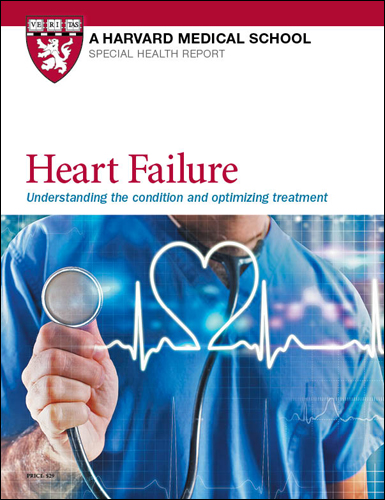Brushing off heart failure symptoms
Overlooked symptoms and disparities in health care can delay diagnosis and treatment.
- Reviewed by Anthony L. Komaroff, MD, Editor in Chief, Harvard Health Letter; Editorial Advisory Board Member, Harvard Health Publishing

Heart failure is a chronic, progressive, life-threatening condition in which the heart does not pump well. Despite its serious nature, initial symptoms may not seem concerning. "Heart failure is often missed because it can appear in subtle ways. It's not usually diagnosed until months or years later, when symptoms are intolerable and a person is hospitalized for it. By that point, the risk for dying from it has already risen significantly, sometimes higher than the risk of death from cancer. So it's important to catch heart failure early," says Dr. James Januzzi, the Hutter Family Professor of Medicine at Harvard Medical School and a cardiologist at Harvard-affiliated Massachusetts General Hospital.
Symptoms
There are two main ways that heart failure affects the body and triggers symptoms.
One is reduced blood flow to tissues and organs. When they don't receive enough oxygen to do their jobs, any demand you place on your heart — whether it's climbing stairs or simply walking to the kitchen — can make you feel tired.
The other is the body's attempt to make up for low blood flow: the body retains salt and fluid to expand blood volume. Because the heart isn't pumping well, the fluid winds up accumulating in the legs and other areas, causing a buildup called congestion.
"Congestion in the lungs can cause shortness of breath, coughing, or wheezing. In the liver or intestines, congestion can lead to nausea, a feeling of fullness soon after eating, weight gain, abdominal bloating, or abdominal pain," Dr. Januzzi says.
Easily brushed off
When heart failure symptoms are subtle, they can be overlooked and attributed to other causes.
For example:
- Shortness of breath may be blamed on being out of shape.
- Fatigue may be chalked up to getting older.
- Swollen ankles may be attributed to a sedentary lifestyle.
"The overlap between heart failure symptoms and the signs of less sinister health issues can make people feel as if nothing is wrong, particularly early on. Even doctors can miss the warning signs," Dr. Januzzi says. "For example, I've seen patients with heart failure who were at first referred for gallbladder disease, because they developed abdominal discomfort when they ate. These patients can suffer for months to years without a proper diagnosis."
Other obstacles to diagnosis
Undiagnosed heart failure isn't just a matter of hard-to-detect symptoms. Other obstacles to diagnosis include gender, ethnic, and racial disparities in health care.
"Heart failure is frequently underdiagnosed in women, Black, and Hispanic individuals. In part that's due to limited access to health care. But sexism and racism in the system may also lead to certain groups receiving less attention when it comes to recognizing heart failure symptoms," Dr. Januzzi says.
When to call your doctor
Because heart failure is often undetected, Dr. Januzzi suggests calling your doctor to report even subtle signs of the disease.
This is especially true if symptoms are new and if you have risk factors for heart failure, such as diabetes, other heart disease, high blood pressure, obesity, or an unhealthy lifestyle (including smoking, a poor diet, inactivity, or excessive alcohol intake — meaning more than one drink per day).
Diagnosis and treatment
To diagnose heart failure, doctors typically conduct a physical exam and order an electrocardiogram (ECG) to measure the heart's electrical activity.
You may have a blood test to look for natriuretic peptides, substances released by the heart at the earliest stages of heart failure (Dr. Januzzi helped develop the tests to detect these substances). You may also have an echocardiogram, an ultrasound of the heart to determine its size, structure, and ability to pump.
If you're diagnosed with heart failure, you'll need treatment as soon as possible. "There's unmistakable evidence that earlier treatment is associated with better outcomes," Dr. Januzzi says.
Treatments include medications, a low-salt diet, reduced fluid intake, and increased exercise.
"The good news is that there are now many types of medications that lower the risk for heart failure complications, reducing the need for hospitalization or the progression of the disease to premature death," Dr. Januzzi says. "We're not only helping people live much longer, but also dramatically improving their symptoms, so they can have a better quality of life, with more energy."
Image: © Monkey Business Images Ltd/Getty Images
About the Author

Heidi Godman, Executive Editor, Harvard Health Letter
About the Reviewer

Anthony L. Komaroff, MD, Editor in Chief, Harvard Health Letter; Editorial Advisory Board Member, Harvard Health Publishing
Disclaimer:
As a service to our readers, Harvard Health Publishing provides access to our library of archived content. Please note the date of last review or update on all articles.
No content on this site, regardless of date, should ever be used as a substitute for direct medical advice from your doctor or other qualified clinician.
















